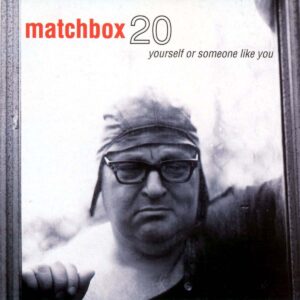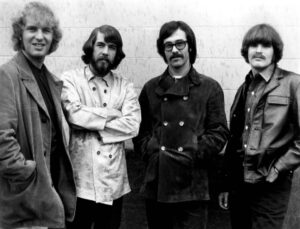The music industry is rife with money, egos, and legal ambiguity, and it stands at the nexus between technology, business, and creativity. Every recording you hear on the radio has its ownership split a myriad of different ways. The song itself is typically owned by the songwriters who wrote it, while the recording of that song is owned by the performers who performed it, but one or the other (or both) have generally signed some or all of their rights away to one or more record companies.
And, of course, the companies are always merging, bands are always switching companies, people are joining and leaving bands, and all the big egos involved with all of this are always trying to push their rights to the limit for their own benefit. All of this makes for some of the dumbest lawsuits in history. Here are five of my favorites.
Rob Thomas Steals His Own Song
Before Rob Thomas rocketed to fame as the lead singer and songwriter behind Matchbox Twenty, he was part of an Orlando-based band called Tabitha’s Secret. One of the group’s best known tracks was called ‘3 a.m.,’ which was a Thomas composition about the frustration and loneliness he experienced when his mother was fighting life-threatening cancer. Needless to say, Thomas considered it to be a very, very personal song, and it is still a staple of his live performances today.
Tabitha’s Secret broke up when two of its members, Jay Stanley and John Goff, decided not to accept a record deal from Matt Serletic’s Melisma, a company associated with Atlantic Records. Rob Thomas and two of the band’s other members, Brian Yale and Paul Doucette, accepted the record deal and soon re-formed with two new members—Adam Gaynor and Kyle Cook. The new band was christened Matchbox Twenty and its debut album, Yourself or Someone Like You, went on to become one of the best selling albums of the 1990’s (and one of my personal favorites). One of the tracks on the new album was the aforementioned ‘3 a.m.,’ which Thomas re-recorded with his new band.
Stanley and Goff apparently didn’t like the idea of their former bandmates hitting it big with the record deal that they had rejected, and the re-use of ‘3 a.m.’ gave them an opportunity to try and take some of that largess for themselves. They sued Matchbox Twenty (Stanley & Goff v. Matchbox Twenty) for a fiduciary breach of contract, and Serletic for tortious interference. The lawsuit went on for five years before being settled out of court. Legally speaking, it is pretty clear that the writer of a song has a right to their own song. But even if Stanley & Goff had a leg to stand on, they belong on this list. Thomas’s two erstwhile bandmates had a chance to be in on the record deal that birthed Matchbox Twenty, and they walked away from it.
The Napster Case
Napster—the first popular peer-to-peer file sharing system—launched in 1999 and very quickly became a huge success. For the first time, it was relatively easy and painless to get MP3’s of your favorite songs for free. Of course, distributing copyrighted music without authorization is a crime . . . but who is committing the crime? Is it the user who shares the copyrighted song, or the network over-which it is transferred?
The correct answer, of course, is that the individuals who share a copyrighted file are the ones committing the crime. Google isn’t responsible for a harassing email sent over Gmail, and Verizon isn’t responsible for a hack attack initiated by a FIOS user. Likewise, Napster wasn’t responsible for users sharing songs over their system. But the music industry has never been bound by logic so, at the prompting of metal group Metallica, we had one of the most absurd intellectual property cases to ever come through the U.S. court system: A&M Records, Inc. v. Napster, Inc.
In 2001, the court issued an injunction demanding that Napster somehow prevent the trading of copyrighted music over its network without authorization from the owner of the copyright. Of course this was technically impossible, and to comply with the order the Napster network was shut down entirely a few months later. I still maintain that this was a terrible miscarriage of justice; U.S. law protects Internet service providers from being prosecuted for their users’ illegal activities (§230, Title 47), and this protection applies to online services as well as access providers (Schneider v. Amazon.com, Inc.). The Napster case never should have even made it to trial.
The shame of it is that I don’t really blame Metallica for lashing out against Internet file sharing, but they placed the blame in the wrong place. It was the users of Napster who were breaking the law, not Napster itself (which just provided a conduit for sharing files; a service that could be used or mis-used by its users at-will). And if Metallica really wanted to fix the problem, they would have demanded that A&M Records hurry up and provide a legal way for consumers to get music online. The solution to the file sharing problem came years later from a low-volume niche computer company called Apple, not from any of the music industry players.
Roger Waters v. Pink Floyd
Pink Floyd is probably my single most favorite band, and bassist Roger Waters—the primary songwriter behind many of their most well-known tracks—is easily my favorite rock lyricist. After their chart-busting hit record Dark Side of the Moon, Waters began to wrest more and more control over the band’s artistic direction from his bandmates. As so often happens in these cases, the band eventually disintegrated, with Waters declaring Pink Floyd to be a ‘spent force.’
Waters went to the U.K. high court demanding an injunction against his band mates ever using the name Pink Floyd again without his approval, however he had also notified EMI and Columbia Records that he was formally leaving the group. You can’t leave a band, and unilaterally declare that the band can’t continue to exist without you.
Ultimately, Pink Floyd—then technically a duo composed of David Gilmour and Nick Mason, as keyboardist Richard Wright had been dismissed well before Waters left—retained rights to its own name. As part of the settlement, Waters retained the right to perform Pink Floyd songs from the time he was in the band, and retained rights to some of his individual contributions. The re-formed group, with Wright but without Waters, went on to release two more successful studio albums and several live albums.
There is no doubt that Waters is a lyrical genius, and is behind some of the best rock songs ever composed, but it takes real hubris to assume that when you leave a band that band ceases to exist. Pink Floyd was certainly a lesser group without Waters (though it was still quite good), but it was still Pink Floyd.
Apple v. Apple
The general rule on trademarks is pretty simple. If you make up a name, like Microsoft or TiVo, then you own that name and nobody else can use it for anything. If, however, you use an existing, generic word, then you can claim trademark in a specific area. If I started a cabinet company called Pretty Cabinets, that would not prevent somebody else from starting a plumbing company and calling it Pretty Plumbing . . . but it would prevent somebody from starting another cabinet company and calling it Pretty Cabinets, or possibly even variants like Pretty Good Cabinets that might confuse consumers.
As such, Apple Computer should have been in the clear . . . even though the Beatles’ company Apple Corps (and its subsidiary Apple Records) already claimed the name. They were operating in two distinct fields with a generic term; neither had any overriding right to the name ‘Apple.’
Apple Corps first sued Apple Computer in 1978 claiming a trademark violation, and the two companies settled out of court with an agreement that Apple Corps wouldn’t make computers and Apple Computer wouldn’t enter the music industry (Apple Corps v. Apple Computer). In 1986, when Apple Computer added a sound chip to some of its computers, Apple Corps sued again claiming violation of the settlement. They again settled the dispute out of court.
But it didn’t end there. In 1991 when Macs started coming with digital sounds (for errors and the like), Apple Corps sued again and the two companies again settled out of court with an agreement that Apple Corps held right to the Apple name on “creative works whose principal content is music,” while Apple Computer held the right to the name for “goods or services . . . used to reproduce, run, play or otherwise deliver such content,” though not on any physical media.
After Apple Computer launched the iTunes Music Store in 2003, Apple Corps sued them again claiming violation of the 1991 agreement, even though Apple Computer clearly had rights to the name for delivering music content (except on physical media). If iTunes were sending out CD’s it might have been a violation, but iTunes was a fully electronic distribution system. The U.K. courts ruled in 2006 that Apple Computer had not violated the agreement, and the whole mess was finally put to rest in 2007 when the two companies agreed that Apple Inc. (the re-christened Apple Computer) would be assigned all trademark rights related to Apple, and would perpetually license some of those trademarks back to Apple Corps.
It was all much ado about nothing, really. The existence of Apple Computer had no material impact on Apple Corps’s business, and created no serious customer confusion. The long string of lawsuits was a frivolous and wasteful conflict between two notable, creative companies.
Fogerty Sounds Like Fogerty
John Fogerty was the lead singer, songwriter, and guitarist of one of the best bands of the 1960’s and 70’s: Creedence Clearwater Revival (CCR). In an all-too-typical example of music industry egos, Fogerty began to assert more and more control over CCR and increasingly felt that the rest of the band was holding him back. In 1972, Fogerty wanted to leave the band . . . but he was still stuck in a recording contract with Fantasy Records, owned by Saul Zaentz. They came to an agreement that Fogerty could leave, but only if he agreed to sign over the rights to all of CCR’s music to the company. So he did.
Fogerty had some minor success as a soloist, but didn’t really hit it big (again) until he released his Centerfield album in 1985. Zaentz and Fantasy Records promptly sued Fogerty (Fantasy, Inc. v. Fogerty), arguing that one track on Centerfield—’The Old Man Down the Road’—sounded too much like the CCR hit ‘Run Through the Jungle.’ So, in effect, Fogerty was being sued because a song that he wrote and performed sounded a bit similar to another song he wrote and performed.
The case did eventually go to trial, and the court found that Fogerty sounds a lot like Fogerty (as you might expect) . . . but the new track was substantially different than the older one and was not infringing.
Saul Zaentz also filed a separate case against Fogerty claiming defamation of character for another track on the album, transparently titled ‘Zanz Can’t Dance.’ They settled that case out of court, and as part of the settlement Fogerty had to rename the track to ‘Vanz Kant Danz.’






